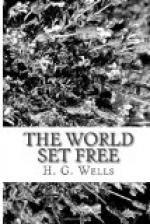It would have seemed a strange thing to the men of the former time that it should be an open question as it is to-day whether the world is wholly Christian or not Christian at all. But assuredly we have the spirit, and as surely have we left many temporary forms behind. Christianity was the first expression of world religion, the first complete repudiation of tribalism and war and disputation. That it fell presently into the ways of more ancient rituals cannot alter that. The common sense of mankind has toiled through two thousand years of chastening experience to find at last how sound a meaning attaches to the familiar phrases of the Christian faith. The scientific thinker as he widens out to the moral problems of the collective life, comes inevitably upon the words of Christ, and as inevitably does the Christian, as his thought grows clearer, arrive at the world republic. As for the claims of the sects, as for the use of a name and successions, we live in a time that has shaken itself free from such claims and consistencies.
CHAPTER THE FIFTH
THE LAST DAYS OF MARCUS KARENIN
Section 1
The second operation upon Marcus Karenin was performed at the new station for surgical work at Paran, high in the Himalayas above the Sutlej Gorge, where it comes down out of Thibet.
It is a place of such wildness and beauty as no other scenery in the world affords. The granite terrace which runs round the four sides of the low block of laboratories looks out in every direction upon mountains. Far below in the hidden depths of a shadowy blue cleft, the river pours down in its tumultuous passage to the swarming plains of India. No sound of its roaring haste comes up to those serenities. Beyond that blue gulf, in which whole forests of giant deodars seem no more than small patches of moss, rise vast precipices of many-coloured rock, fretted above, lined by snowfalls, and jagged into pinnacles. These are the northward wall of a towering wilderness of ice and snow which clambers southward higher and wilder and vaster to the culminating summits of our globe, to Dhaulagiri and Everest. Here are cliffs of which no other land can show the like, and deep chasms in which Mt. Blanc might be plunged and hidden. Here are icefields as big as inland seas on which the tumbled boulders lie so thickly that strange little flowers can bloom among them under the untempered sunshine. To the northward, and blocking out any vision of the uplands of Thibet, rises that citadel of porcelain, that gothic pile, the Lio Porgyul, walls, towers, and peaks, a clear twelve thousand feet of veined and splintered rock above the river. And beyond it and eastward and westward rise peaks behind peaks, against the dark blue Himalayan sky. Far away below to the south the clouds of the Indian rains pile up abruptly and are stayed by an invisible hand.
Hither it was that with a dreamlike swiftness Karenin flew high over the irrigations of Rajputana and the towers and cupolas of the ultimate Delhi; and the little group of buildings, albeit the southward wall dropped nearly five hundred feet, seemed to him as he soared down to it like a toy lost among these mountain wildernesses. No road came up to this place; it was reached only by flight.




